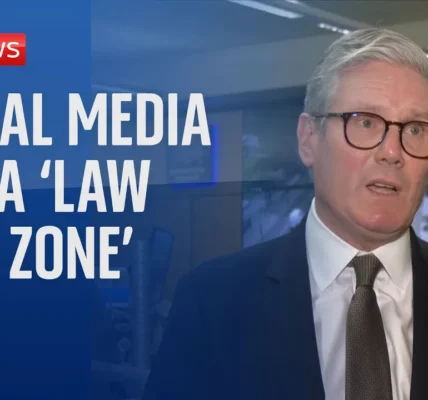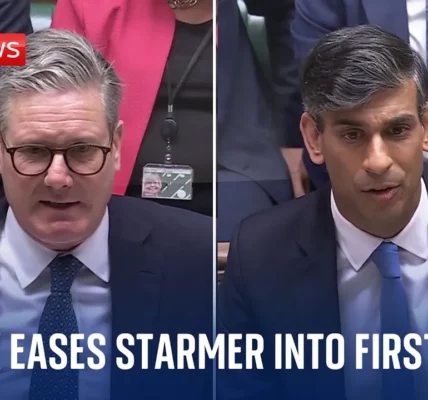Mark Logan Defects to Labour: The Implications for UK Politics

This article explores the recent political defection of Mark Logan, a former Conservative MP for Bolton Northeast, who has switched allegiance to the Labour Party. We delve into the implications of this move, the context of recent defections, and the broader political landscape in the UK.
Introduction
In a significant turn of events within UK politics, Mark Logan, the former Conservative Member of Parliament (MP) for Bolton Northeast, has announced his defection to the Labour Party. This surprising move comes as he urges constituents to support Labour in the upcoming elections scheduled for July 4th. Logan’s departure from the Conservative Party highlights a growing trend of political realignment in the UK, particularly in marginal constituencies that have shifted between parties in recent years. This article provides an in-depth analysis of Logan’s defection, its implications for the Conservative Party, and the current political climate in the UK.
Mark Logan’s Political Journey
Mark Logan first entered the political arena during the 2019 general election, where he won the Bolton Northeast seat with a slender majority of just 378 votes. Prior to his election, Bolton Northeast had a long history of Labour representation, having been held by the party since 1997. Logan’s victory was part of a broader trend during the Brexit election, where several traditionally Labour strongholds turned Conservative. However, the circumstances surrounding his defection suggest that the political landscape may be shifting once again.
The Context of the Defection
- Logan’s tenure as an MP has been marked by challenges, including the need to maintain a fragile majority in a constituency that leans towards Labour.
- The political climate has become increasingly polarized, with public sentiment shifting in response to the Conservative government’s policies and leadership.
- Logan’s decision to defect reflects broader discontent within the Conservative ranks and could signal a wave of similar moves among MPs facing electoral pressure.
Recent Defections and Their Significance
Logan’s defection is not an isolated incident; it is part of a troubling pattern for the Conservative Party. In recent weeks, several other Conservative MPs have also announced their departures, indicating potential instability within the party. This section examines these recent defections and their implications for the political landscape.
Notable Defections
- Natalie Ali: Recently defected from the Conservative Party to Labour, citing dissatisfaction with government policies, particularly regarding immigration and public welfare.
- Dr. Dan Polter: A former Conservative MP who also switched to Labour, expressing concerns about the government’s handling of the National Health Service (NHS).
- Lucy Allen: Another Conservative MP who defected, opting for the Reform Party, which highlights the fragmentation of traditional party loyalties.
The Impact on the Conservative Party
The string of defections poses significant challenges for Prime Minister Rishi Sunak. Each departure not only weakens the party’s parliamentary strength but also raises questions about its future electoral viability. The recent exodus of MPs might lead to:
- A loss of confidence among party members and supporters.
- An erosion of the Conservative Party’s base in key constituencies.
- A potential shift in public perception, as voters may view these defections as a sign of internal strife and dissatisfaction.
The Broader Political Climate
As the political landscape in the UK evolves, Labour faces its own set of challenges, particularly regarding internal factionalism and the potential deselection of key figures like Diane Abbott. This section explores the intersection of these dynamics and their implications for Labour’s strategy moving forward.
Internal Challenges for Labour
Despite the influx of defectors from the Conservative Party, Labour is grappling with its internal issues, particularly concerning the treatment of left-leaning MPs like Diane Abbott. The accusations of a purge within the party have led to:
- Increased tensions between factions within Labour, as members align themselves with different ideologies.
- Public criticism of Labour leader Keir Starmer’s approach to party management, particularly regarding his handling of dissenting voices.
- Concerns regarding how these internal conflicts might distract the party from effectively campaigning on key issues such as the economy and healthcare.
Conclusion
Mark Logan’s defection to Labour is a pivotal moment in UK politics, underscoring the shifting allegiances that are reshaping the political landscape. As the Conservative Party grapples with the ramifications of multiple defections, Labour must navigate its internal challenges to capitalize on this opportunity. The upcoming elections will be crucial in determining the future of both parties. Voters are urged to stay informed and consider how these developments might impact their constituencies and the direction of UK politics as a whole.
For more insights on the evolving political landscape, check out our related articles on UK Politics and Labour Party Strategies.
“`




